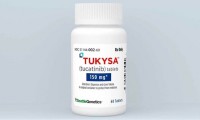-
Pfizer’s RSV vaccine granted EC approval to protect infants and older adults
- Source: drugdu
- 125
- August 30, 2023
-
Pfizer, Moderna Target Emerging Variants with Updated COVID-19 Shots
- Source: drugdu
- 191
- August 22, 2023
-
With trial win, Seagen’s breast cancer drug Tukysa boosts Roche’s Kadcyla—and Pfizer’s $43B buyout
- Source: drugdu
- 151
- August 19, 2023
-
Pfizer Bispecific Drug Wins FDA Accelerated Approval for Multiple Myeloma
- Source: drugdu
- 216
- August 17, 2023
-
Chasing AstraZeneca and Pfizer, Johnson & Johnson snags FDA nod for prostate cancer combo Akeega
- Source: drugdu
- 118
- August 16, 2023
-
Pfizer faces whistleblower lawsuit from former compliance manager who says he flagged possible fraud in China
- Source: drugdu
- 460
- August 12, 2023
-
GSK files lawsuit against Pfizer over RSV vaccine patent infringement
- Source: drugdu
- 116
- August 7, 2023
-
As COVID revenues disappoint, once-high-flying Pfizer looks at possible cost cuts
- Source: drugdu
- 170
- August 3, 2023
-
Pfizer and Flagship Pioneering Sign Drug Discovery Partnership Worth up to $7bn
- Source: drugdu
- 110
- July 24, 2023
-
US FTC Requests More Information on Pfizer’s Proposed $43bn Seagen Acquisition
- Source: drugdu
- 220
- July 21, 2023
your submission has already been received.
OK
Subscribe
Please enter a valid Email address!
Submit
The most relevant industry news & insight will be sent to you every two weeks.













